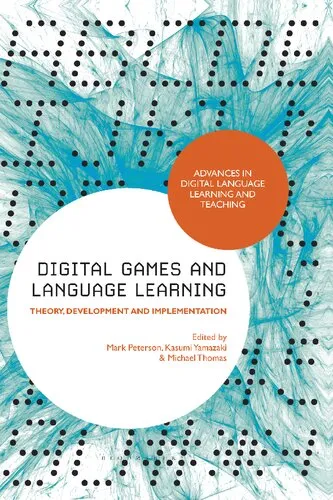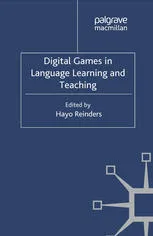Digital Games and Language Learning: Theory, Development and Implementation
4.0
Reviews from our users

You Can Ask your questions from this book's AI after Login
Each download or ask from book AI costs 2 points. To earn more free points, please visit the Points Guide Page and complete some valuable actions.Related Refrences:
Introduction to Digital Games and Language Learning: Theory, Development and Implementation
"Digital Games and Language Learning: Theory, Development and Implementation" is a comprehensive academic work that delves into the multifaceted relationship between digital gaming and language education. Developed by editors Mark Peterson, Kasumi Yamazaki, and Michael Thomas, this book sheds light on the pedagogical potential of digital games as innovative tools for language acquisition. By combining theoretical frameworks, empirical studies, and practical applications, the book aims to bridge the gaps between the fields of game-based learning and second language acquisition.
Detailed Summary
The book is divided into several chapters, each carefully crafted to examine a specific aspect of digital game-based language learning (DGBLL). It provides a deep exploration of the theoretical underpinnings of DGBLL, blending insights from linguistics, psychology, and educational technology. By weaving together research findings and hands-on implementation strategies, this book empowers educators, game developers, and researchers to understand how digital games can enhance linguistic competencies such as vocabulary acquisition, speaking, listening, reading, and writing.
Additionally, the book addresses the development of learner autonomy, motivation, and engagement through the lens of game-based experiences. It critically evaluates various types of games—ranging from commercial off-the-shelf (COTS) games to serious educational games—and their potential to foster multilingual and multicultural communication. With actionable recommendations, the authors encourage the design and implementation of effective game-based learning environments tailored to diverse language learners.
Key Takeaways
- Understanding the theoretical foundations of digital games in language education.
- Insights into how games can develop linguistic and intercultural competencies.
- Practical strategies for integrating digital games into language classrooms.
- Exploration of real-world case studies showcasing successful DGBLL applications.
- Evaluation of the challenges and limitations of adopting game-based learning in different contexts.
Famous Quotes from the Book
"Digital games are not merely entertainment; they are immersive environments that can facilitate authentic, meaningful, and rich language learning experiences."
"By engaging players in problem-solving, decision-making, and interaction, digital games create fertile ground for practicing real-world communication skills."
"The challenge for educators is not whether digital games belong in education, but rather how to effectively harness their potential for meaningful learning."
Why This Book Matters
In an age where digital transformation is reshaping education, "Digital Games and Language Learning" serves as a critical resource for professionals and academics looking to innovate teaching methodologies. By focusing on the convergence of gaming and pedagogy, this book challenges traditional perspectives on language learning and introduces dynamic ways to engage learners in today's digital age. It matters because it resonates with 21st-century learners, who are increasingly immersed in interactive multimedia environments.
Furthermore, this book is a trailblazer in addressing the practical concerns of integrating digital games into educational systems. With its holistic approach, it inspires educators to embrace emerging technologies while providing the necessary tools to make informed decisions. For researchers, it offers a robust foundation to further explore this growing subfield of applied linguistics and educational technology.
Ultimately, "Digital Games and Language Learning" matters because it aligns with global efforts to transform how education is delivered, making it more engaging, inclusive, and effective for learners worldwide.
This introduction highlights the significance of "Digital Games and Language Learning: Theory, Development and Implementation" in advancing our understanding of digital game-based language education. By unlocking the potential of games, this work contributes to the evolution of teaching practices, the enhancement of learner experiences, and the growth of interdisciplinary research.
Free Direct Download
You Can Download this book after Login
Accessing books through legal platforms and public libraries not only supports the rights of authors and publishers but also contributes to the sustainability of reading culture. Before downloading, please take a moment to consider these options.
Find this book on other platforms:
WorldCat helps you find books in libraries worldwide.
See ratings, reviews, and discussions on Goodreads.
Find and buy rare or used books on AbeBooks.
1229
بازدید4.0
امتیاز50
نظر98%
رضایتReviews:
4.0
Based on 0 users review
"کیفیت چاپ عالی بود، خیلی راضیام"
Questions & Answers
Ask questions about this book or help others by answering
No questions yet. Be the first to ask!



